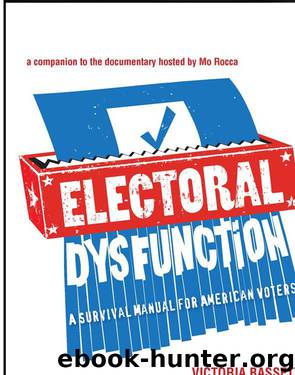Electoral Dysfunction: A Survival Manual for American Voters by Bassetti Victoria

Author:Bassetti, Victoria [Bassetti, Victoria]
Language: eng
Format: epub
ISBN: 9781595588210
Publisher: New Press, The
Published: 2012-09-17T22:00:00+00:00
FROM KANGAROO VOTING TO RESIDUAL VOTES
Cemodanovs voted using a paper ballot. Everyone in Maine does today. But until 1831, most elections in Maine were conducted publicly. People voted by voice or by holding up their hands, as they did in most states. Early American and pre-revolutionary elections were often raucous affairs with “barbequed oxen, kegs of rum and everybody roaring drunk.” By the mid-nineteenth century, however, most states had begun using paper ballots. But election officials did not print standard ballots for use by voters. Voters either hand-wrote their selections on scraps of paper or came in with pre-printed ballots. Political parties widely distributed these pre-printed ballots to voters with only that party’s candidates on the slip of paper. Voters then folded them up and dropped them in the ballot box. Early versions of the pre-printed ballots gave voters room to scratch out candidates’ names and write in alternates. But parties soon learned from their mistakes and began printing ballots that were so tightly packed that most voters simply voted the straight party line. Since most of the pre-printed ballots were visually distinctive from one another—different colors, different shapes—officials and observers at polling places were easily able to see who voted for whom. The system was remarkably vulnerable to intimidation and corruption. Reform-minded individuals in the late nineteenth century decided to take it on. (See Appendix C for examples.)
One of the first men to look at the rickety system for casting and counting votes was America’s greatest inventor, Thomas Alva Edison. In 1869, at age twenty-two, the Ohio-born Edison made the fateful decision to abandon his job as a telegraph operator and commit himself to inventing full time. His first patent was issued on June 1, 1869: “Patent Number 90,646 for the Electrographic Vote Recorder.” Shortly after the patent was issued, an investor took the device to Washington, D.C., to show to a member of Congress. He was rebuffed. “If there is any invention on earth that we don’t want down here, that is it,” a Representative told him. Edison read the market and quickly moved on from voting equipment. His next invention was an improved stock market tickertape machine. He made a fortune on it.
Instead, America’s first major revolution in voting technology was imported from Australia. In 1856, Australia was the first nation to begin using uniform ballots with all candidates’ names printed on them at the government’s expense. The Australian ballot significantly decreased the likelihood of voter intimidation by making voting a private act and, when coupled with voter registration systems, decreased the opportunity for ballot box stuffing. It was much harder to cram a ballot box full of party tickets where there were actual records of how many people voted in a precinct and when the number of preprinted ballots was closely controlled. Of course, the Australian ballot did not eliminate intimidation and ballot fraud. They shifted in form. Election fraud henceforth turned on how ballots were counted. And election officials created ever more clever ways to throw out ballots.
Download
This site does not store any files on its server. We only index and link to content provided by other sites. Please contact the content providers to delete copyright contents if any and email us, we'll remove relevant links or contents immediately.
| Anthropology | Archaeology |
| Philosophy | Politics & Government |
| Social Sciences | Sociology |
| Women's Studies |
The Secret History by Donna Tartt(18220)
The Social Justice Warrior Handbook by Lisa De Pasquale(11961)
Thirteen Reasons Why by Jay Asher(8470)
This Is How You Lose Her by Junot Diaz(6460)
Weapons of Math Destruction by Cathy O'Neil(5851)
Zero to One by Peter Thiel(5506)
Beartown by Fredrik Backman(5372)
The Myth of the Strong Leader by Archie Brown(5248)
The Fire Next Time by James Baldwin(5030)
How Democracies Die by Steven Levitsky & Daniel Ziblatt(4970)
Promise Me, Dad by Joe Biden(4916)
Stone's Rules by Roger Stone(4871)
100 Deadly Skills by Clint Emerson(4700)
A Higher Loyalty: Truth, Lies, and Leadership by James Comey(4564)
Rise and Kill First by Ronen Bergman(4553)
Secrecy World by Jake Bernstein(4406)
The David Icke Guide to the Global Conspiracy (and how to end it) by David Icke(4392)
The Farm by Tom Rob Smith(4332)
The Doomsday Machine by Daniel Ellsberg(4253)
